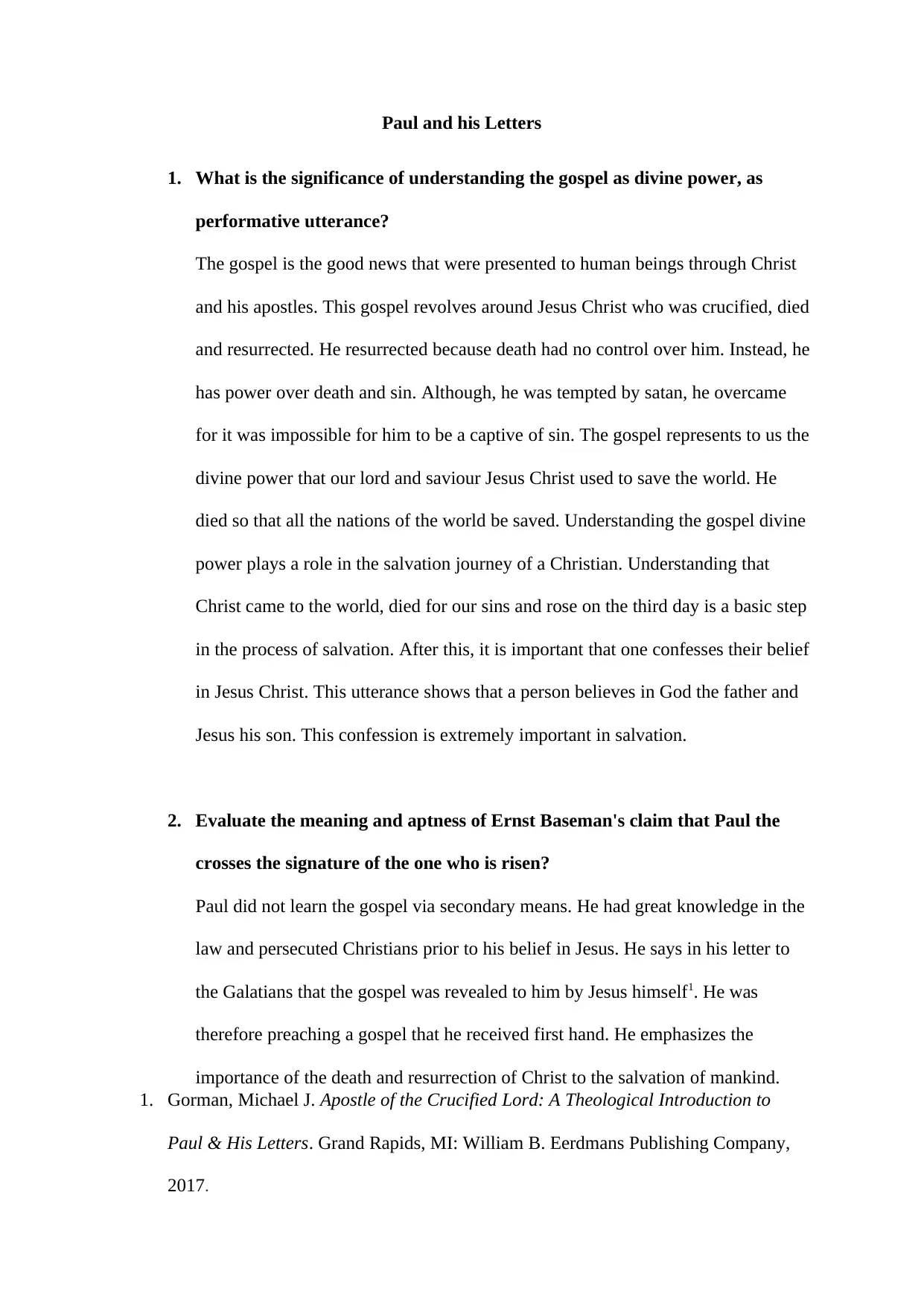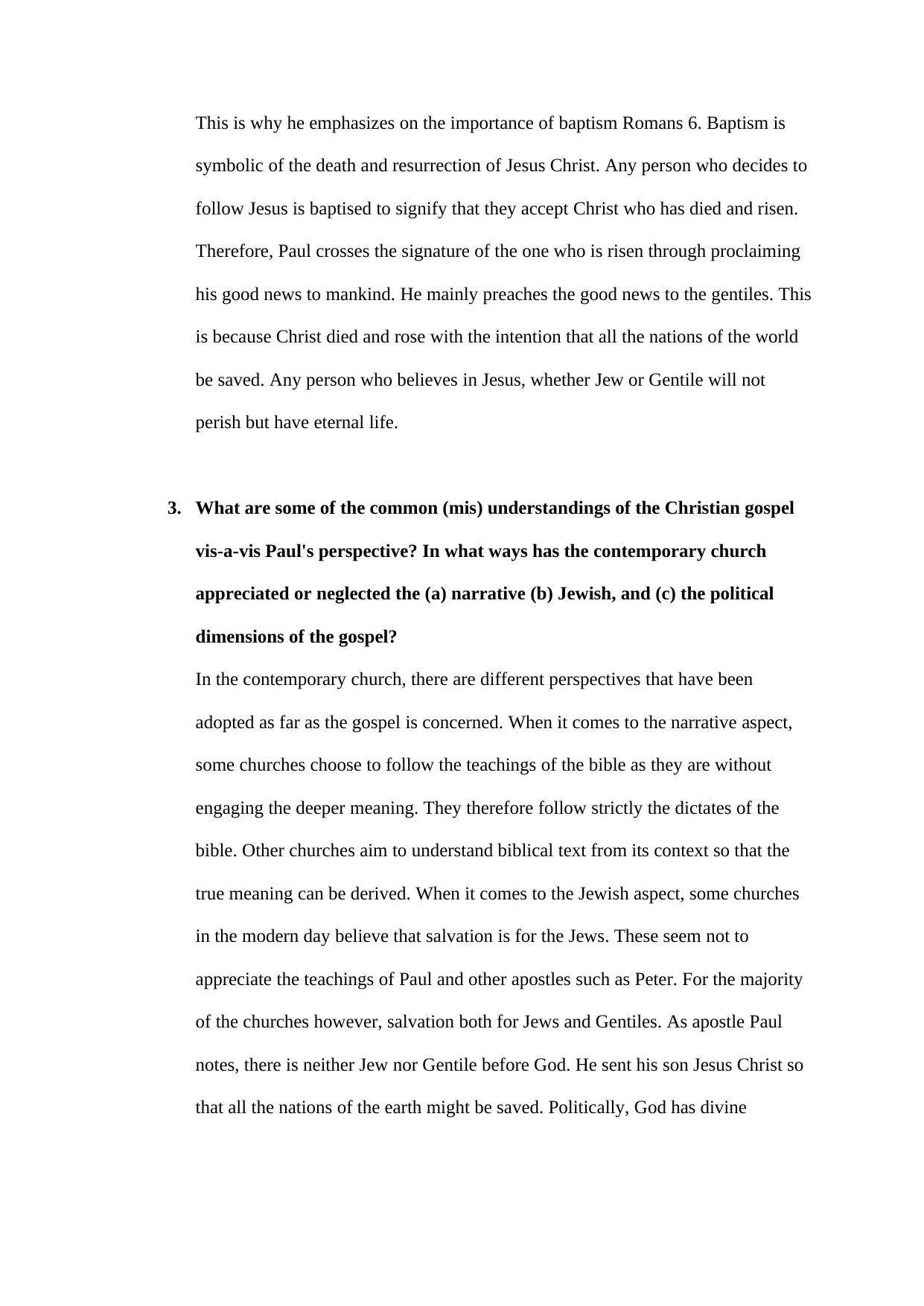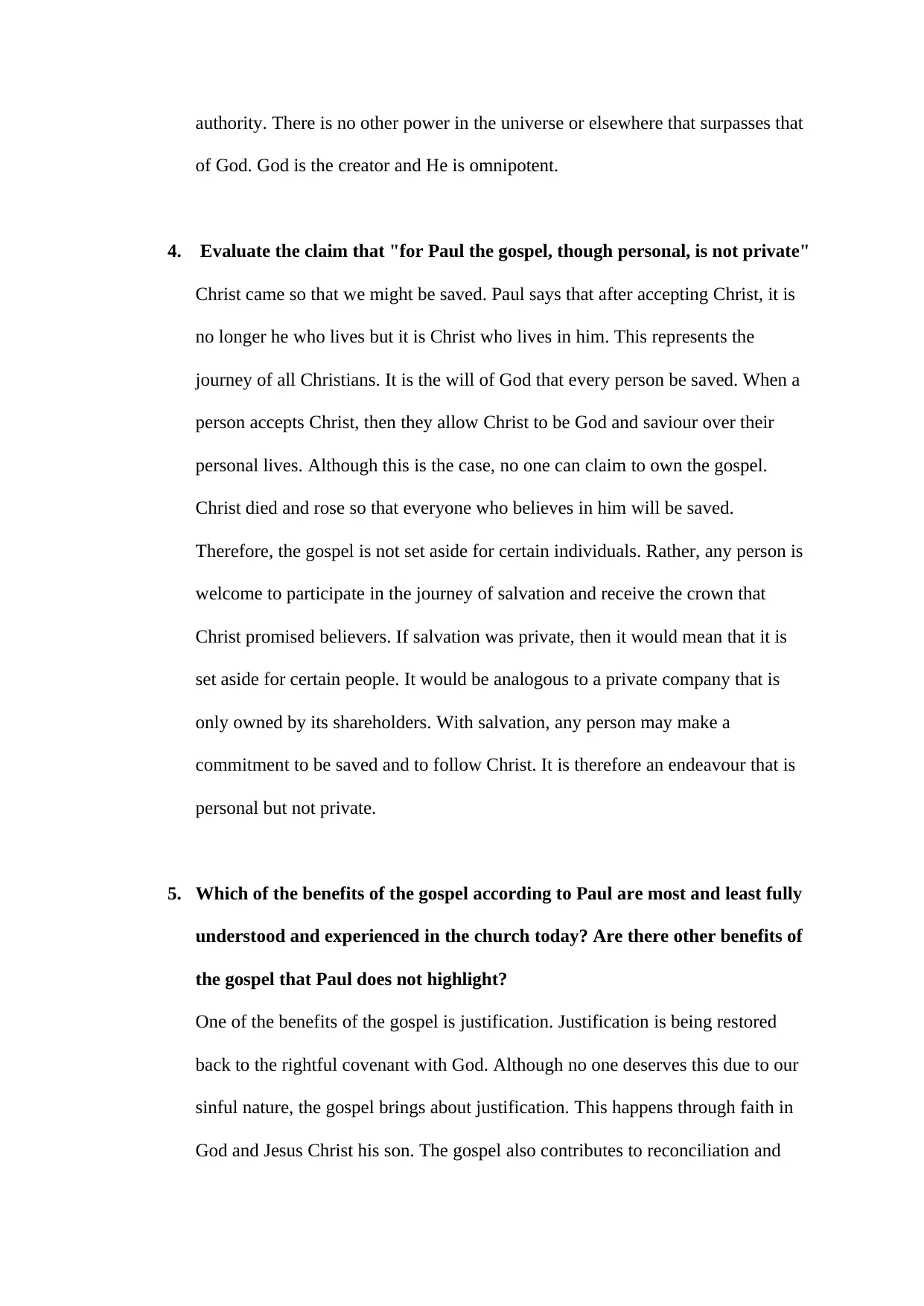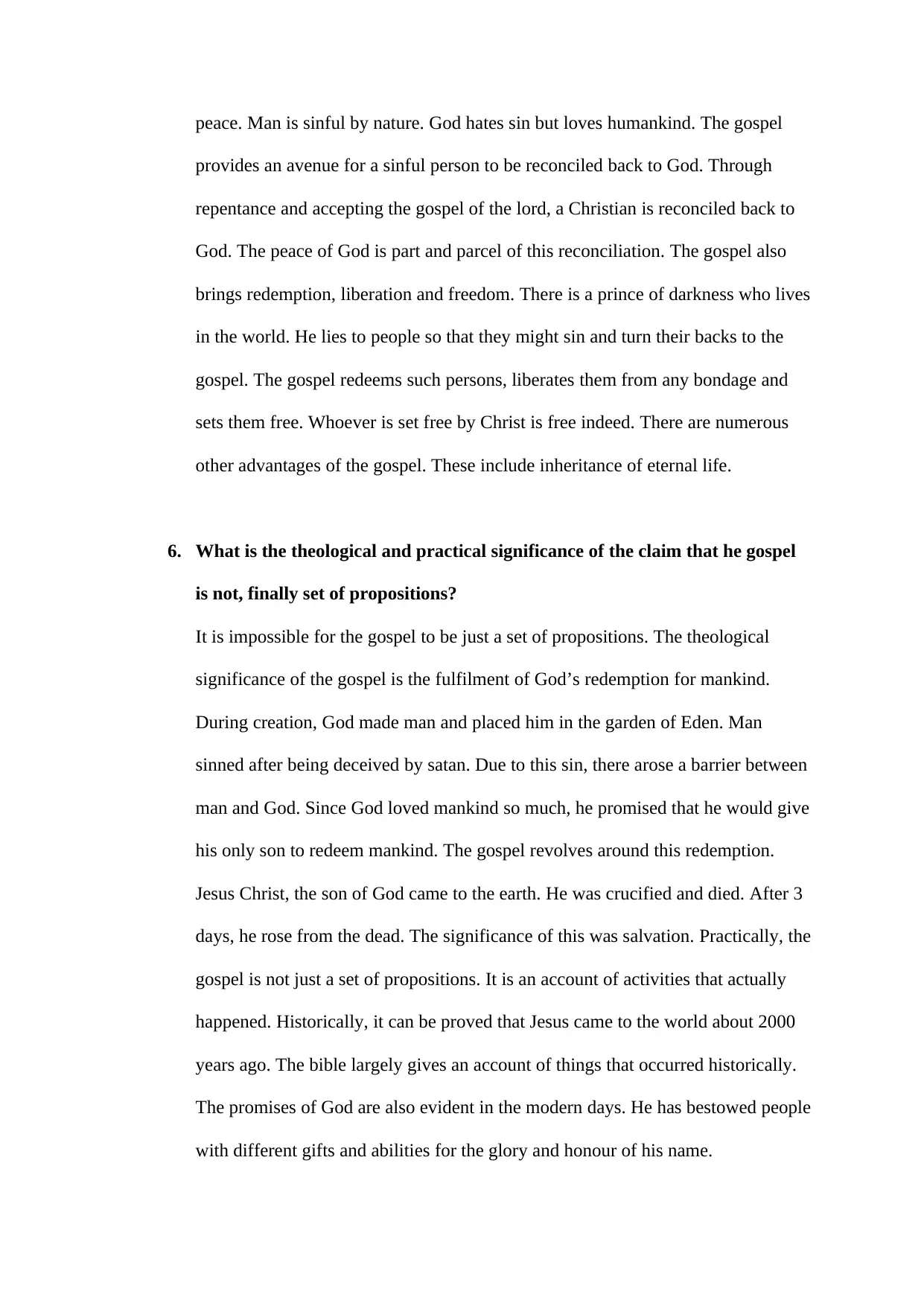The Gospel According to Paul: Significance & Contemporary Church
VerifiedAdded on 2023/04/07
|6
|1284
|165
Essay
AI Summary
This essay delves into the significance of the gospel as portrayed in Paul's letters, exploring its divine power and performative utterance. It evaluates Ernst Baseman's claim about Paul and the risen Christ, examines common misunderstandings of the Christian gospel, and analyzes the narrative, Jewish, and political dimensions within Paul's perspective. The essay further assesses the claim that the gospel, though personal, is not private, and discusses the benefits of the gospel as understood and experienced in the church today. Finally, it explores the theological and practical significance of the gospel, emphasizing that it is not merely a set of propositions but a lived reality.

Paul and his Letters
Student’s Name
Title of the Course
Instructor’s Name
Date
Student’s Name
Title of the Course
Instructor’s Name
Date
Paraphrase This Document
Need a fresh take? Get an instant paraphrase of this document with our AI Paraphraser

Paul and his Letters
1. What is the significance of understanding the gospel as divine power, as
performative utterance?
The gospel is the good news that were presented to human beings through Christ
and his apostles. This gospel revolves around Jesus Christ who was crucified, died
and resurrected. He resurrected because death had no control over him. Instead, he
has power over death and sin. Although, he was tempted by satan, he overcame
for it was impossible for him to be a captive of sin. The gospel represents to us the
divine power that our lord and saviour Jesus Christ used to save the world. He
died so that all the nations of the world be saved. Understanding the gospel divine
power plays a role in the salvation journey of a Christian. Understanding that
Christ came to the world, died for our sins and rose on the third day is a basic step
in the process of salvation. After this, it is important that one confesses their belief
in Jesus Christ. This utterance shows that a person believes in God the father and
Jesus his son. This confession is extremely important in salvation.
2. Evaluate the meaning and aptness of Ernst Baseman's claim that Paul the
crosses the signature of the one who is risen?
Paul did not learn the gospel via secondary means. He had great knowledge in the
law and persecuted Christians prior to his belief in Jesus. He says in his letter to
the Galatians that the gospel was revealed to him by Jesus himself1. He was
therefore preaching a gospel that he received first hand. He emphasizes the
importance of the death and resurrection of Christ to the salvation of mankind.
1. Gorman, Michael J. Apostle of the Crucified Lord: A Theological Introduction to
Paul & His Letters. Grand Rapids, MI: William B. Eerdmans Publishing Company,
2017.
1. What is the significance of understanding the gospel as divine power, as
performative utterance?
The gospel is the good news that were presented to human beings through Christ
and his apostles. This gospel revolves around Jesus Christ who was crucified, died
and resurrected. He resurrected because death had no control over him. Instead, he
has power over death and sin. Although, he was tempted by satan, he overcame
for it was impossible for him to be a captive of sin. The gospel represents to us the
divine power that our lord and saviour Jesus Christ used to save the world. He
died so that all the nations of the world be saved. Understanding the gospel divine
power plays a role in the salvation journey of a Christian. Understanding that
Christ came to the world, died for our sins and rose on the third day is a basic step
in the process of salvation. After this, it is important that one confesses their belief
in Jesus Christ. This utterance shows that a person believes in God the father and
Jesus his son. This confession is extremely important in salvation.
2. Evaluate the meaning and aptness of Ernst Baseman's claim that Paul the
crosses the signature of the one who is risen?
Paul did not learn the gospel via secondary means. He had great knowledge in the
law and persecuted Christians prior to his belief in Jesus. He says in his letter to
the Galatians that the gospel was revealed to him by Jesus himself1. He was
therefore preaching a gospel that he received first hand. He emphasizes the
importance of the death and resurrection of Christ to the salvation of mankind.
1. Gorman, Michael J. Apostle of the Crucified Lord: A Theological Introduction to
Paul & His Letters. Grand Rapids, MI: William B. Eerdmans Publishing Company,
2017.

This is why he emphasizes on the importance of baptism Romans 6. Baptism is
symbolic of the death and resurrection of Jesus Christ. Any person who decides to
follow Jesus is baptised to signify that they accept Christ who has died and risen.
Therefore, Paul crosses the signature of the one who is risen through proclaiming
his good news to mankind. He mainly preaches the good news to the gentiles. This
is because Christ died and rose with the intention that all the nations of the world
be saved. Any person who believes in Jesus, whether Jew or Gentile will not
perish but have eternal life.
3. What are some of the common (mis) understandings of the Christian gospel
vis-a-vis Paul's perspective? In what ways has the contemporary church
appreciated or neglected the (a) narrative (b) Jewish, and (c) the political
dimensions of the gospel?
In the contemporary church, there are different perspectives that have been
adopted as far as the gospel is concerned. When it comes to the narrative aspect,
some churches choose to follow the teachings of the bible as they are without
engaging the deeper meaning. They therefore follow strictly the dictates of the
bible. Other churches aim to understand biblical text from its context so that the
true meaning can be derived. When it comes to the Jewish aspect, some churches
in the modern day believe that salvation is for the Jews. These seem not to
appreciate the teachings of Paul and other apostles such as Peter. For the majority
of the churches however, salvation both for Jews and Gentiles. As apostle Paul
notes, there is neither Jew nor Gentile before God. He sent his son Jesus Christ so
that all the nations of the earth might be saved. Politically, God has divine
symbolic of the death and resurrection of Jesus Christ. Any person who decides to
follow Jesus is baptised to signify that they accept Christ who has died and risen.
Therefore, Paul crosses the signature of the one who is risen through proclaiming
his good news to mankind. He mainly preaches the good news to the gentiles. This
is because Christ died and rose with the intention that all the nations of the world
be saved. Any person who believes in Jesus, whether Jew or Gentile will not
perish but have eternal life.
3. What are some of the common (mis) understandings of the Christian gospel
vis-a-vis Paul's perspective? In what ways has the contemporary church
appreciated or neglected the (a) narrative (b) Jewish, and (c) the political
dimensions of the gospel?
In the contemporary church, there are different perspectives that have been
adopted as far as the gospel is concerned. When it comes to the narrative aspect,
some churches choose to follow the teachings of the bible as they are without
engaging the deeper meaning. They therefore follow strictly the dictates of the
bible. Other churches aim to understand biblical text from its context so that the
true meaning can be derived. When it comes to the Jewish aspect, some churches
in the modern day believe that salvation is for the Jews. These seem not to
appreciate the teachings of Paul and other apostles such as Peter. For the majority
of the churches however, salvation both for Jews and Gentiles. As apostle Paul
notes, there is neither Jew nor Gentile before God. He sent his son Jesus Christ so
that all the nations of the earth might be saved. Politically, God has divine
⊘ This is a preview!⊘
Do you want full access?
Subscribe today to unlock all pages.

Trusted by 1+ million students worldwide

authority. There is no other power in the universe or elsewhere that surpasses that
of God. God is the creator and He is omnipotent.
4. Evaluate the claim that "for Paul the gospel, though personal, is not private"
Christ came so that we might be saved. Paul says that after accepting Christ, it is
no longer he who lives but it is Christ who lives in him. This represents the
journey of all Christians. It is the will of God that every person be saved. When a
person accepts Christ, then they allow Christ to be God and saviour over their
personal lives. Although this is the case, no one can claim to own the gospel.
Christ died and rose so that everyone who believes in him will be saved.
Therefore, the gospel is not set aside for certain individuals. Rather, any person is
welcome to participate in the journey of salvation and receive the crown that
Christ promised believers. If salvation was private, then it would mean that it is
set aside for certain people. It would be analogous to a private company that is
only owned by its shareholders. With salvation, any person may make a
commitment to be saved and to follow Christ. It is therefore an endeavour that is
personal but not private.
5. Which of the benefits of the gospel according to Paul are most and least fully
understood and experienced in the church today? Are there other benefits of
the gospel that Paul does not highlight?
One of the benefits of the gospel is justification. Justification is being restored
back to the rightful covenant with God. Although no one deserves this due to our
sinful nature, the gospel brings about justification. This happens through faith in
God and Jesus Christ his son. The gospel also contributes to reconciliation and
of God. God is the creator and He is omnipotent.
4. Evaluate the claim that "for Paul the gospel, though personal, is not private"
Christ came so that we might be saved. Paul says that after accepting Christ, it is
no longer he who lives but it is Christ who lives in him. This represents the
journey of all Christians. It is the will of God that every person be saved. When a
person accepts Christ, then they allow Christ to be God and saviour over their
personal lives. Although this is the case, no one can claim to own the gospel.
Christ died and rose so that everyone who believes in him will be saved.
Therefore, the gospel is not set aside for certain individuals. Rather, any person is
welcome to participate in the journey of salvation and receive the crown that
Christ promised believers. If salvation was private, then it would mean that it is
set aside for certain people. It would be analogous to a private company that is
only owned by its shareholders. With salvation, any person may make a
commitment to be saved and to follow Christ. It is therefore an endeavour that is
personal but not private.
5. Which of the benefits of the gospel according to Paul are most and least fully
understood and experienced in the church today? Are there other benefits of
the gospel that Paul does not highlight?
One of the benefits of the gospel is justification. Justification is being restored
back to the rightful covenant with God. Although no one deserves this due to our
sinful nature, the gospel brings about justification. This happens through faith in
God and Jesus Christ his son. The gospel also contributes to reconciliation and
Paraphrase This Document
Need a fresh take? Get an instant paraphrase of this document with our AI Paraphraser

peace. Man is sinful by nature. God hates sin but loves humankind. The gospel
provides an avenue for a sinful person to be reconciled back to God. Through
repentance and accepting the gospel of the lord, a Christian is reconciled back to
God. The peace of God is part and parcel of this reconciliation. The gospel also
brings redemption, liberation and freedom. There is a prince of darkness who lives
in the world. He lies to people so that they might sin and turn their backs to the
gospel. The gospel redeems such persons, liberates them from any bondage and
sets them free. Whoever is set free by Christ is free indeed. There are numerous
other advantages of the gospel. These include inheritance of eternal life.
6. What is the theological and practical significance of the claim that he gospel
is not, finally set of propositions?
It is impossible for the gospel to be just a set of propositions. The theological
significance of the gospel is the fulfilment of God’s redemption for mankind.
During creation, God made man and placed him in the garden of Eden. Man
sinned after being deceived by satan. Due to this sin, there arose a barrier between
man and God. Since God loved mankind so much, he promised that he would give
his only son to redeem mankind. The gospel revolves around this redemption.
Jesus Christ, the son of God came to the earth. He was crucified and died. After 3
days, he rose from the dead. The significance of this was salvation. Practically, the
gospel is not just a set of propositions. It is an account of activities that actually
happened. Historically, it can be proved that Jesus came to the world about 2000
years ago. The bible largely gives an account of things that occurred historically.
The promises of God are also evident in the modern days. He has bestowed people
with different gifts and abilities for the glory and honour of his name.
provides an avenue for a sinful person to be reconciled back to God. Through
repentance and accepting the gospel of the lord, a Christian is reconciled back to
God. The peace of God is part and parcel of this reconciliation. The gospel also
brings redemption, liberation and freedom. There is a prince of darkness who lives
in the world. He lies to people so that they might sin and turn their backs to the
gospel. The gospel redeems such persons, liberates them from any bondage and
sets them free. Whoever is set free by Christ is free indeed. There are numerous
other advantages of the gospel. These include inheritance of eternal life.
6. What is the theological and practical significance of the claim that he gospel
is not, finally set of propositions?
It is impossible for the gospel to be just a set of propositions. The theological
significance of the gospel is the fulfilment of God’s redemption for mankind.
During creation, God made man and placed him in the garden of Eden. Man
sinned after being deceived by satan. Due to this sin, there arose a barrier between
man and God. Since God loved mankind so much, he promised that he would give
his only son to redeem mankind. The gospel revolves around this redemption.
Jesus Christ, the son of God came to the earth. He was crucified and died. After 3
days, he rose from the dead. The significance of this was salvation. Practically, the
gospel is not just a set of propositions. It is an account of activities that actually
happened. Historically, it can be proved that Jesus came to the world about 2000
years ago. The bible largely gives an account of things that occurred historically.
The promises of God are also evident in the modern days. He has bestowed people
with different gifts and abilities for the glory and honour of his name.

References
1. Gorman, Michael J. Apostle of the Crucified Lord: A Theological Introduction to
Paul & His Letters. Grand Rapids, MI: William B. Eerdmans Publishing Company,
2017.
1. Gorman, Michael J. Apostle of the Crucified Lord: A Theological Introduction to
Paul & His Letters. Grand Rapids, MI: William B. Eerdmans Publishing Company,
2017.
⊘ This is a preview!⊘
Do you want full access?
Subscribe today to unlock all pages.

Trusted by 1+ million students worldwide
1 out of 6
Related Documents
Your All-in-One AI-Powered Toolkit for Academic Success.
+13062052269
info@desklib.com
Available 24*7 on WhatsApp / Email
![[object Object]](/_next/static/media/star-bottom.7253800d.svg)
Unlock your academic potential
Copyright © 2020–2026 A2Z Services. All Rights Reserved. Developed and managed by ZUCOL.





